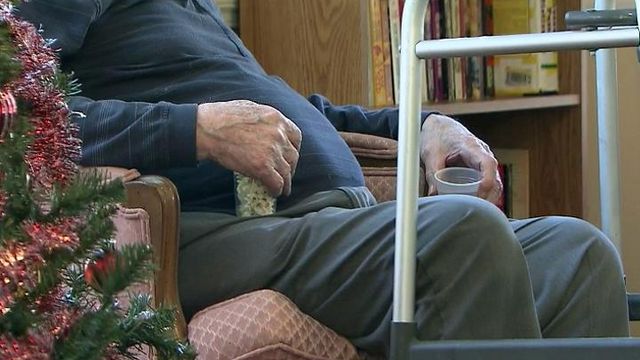Medicaid benefit cuts impact thousands of Alzheimer's patients
The changes to state Medicaid rules impacting group home residents across the state will also affect between 3,000 and 4,000 people with Alzheimer's disease who live in adult care facilities.
Posted — UpdatedThe federal government is pulling 40 percent of its funding out of adult care facilities under new Medicaid rules that aim to ensure the same personal care eligibility standards exist for people no matter where they live, instead of having a lower standard for people in institutional care.
Those rules take effect Jan. 1, and Alzheimer's patients were informed Wednesday that they may be forced out of their homes if state lawmakers don't come up with a solution.
"The time I used to take with your mother to bathe her and to give her the nurturing that she needed? Now, I've got to cut that in half because I don' t have any funding, which means I've got to cut my staff in half," said Julie Brown, the administrator of Cambridge Hills Assisted Living in Pittsboro.
Budget changes approved last summer set aside $39.7 million to help adult care homes with Medicaid reimbursements for personal care services, such as feeding or bathing. The language of the law doesn't include special care units housing Alzheimer's patients or group homes for people with mental illness or developmental disabilities.
"We have been working to try to raise awareness of the need to have a Plan C, since this was Plan B, and it's fallen on deaf ears," said Evelyn Hawthorne, a legislative consultant for the North Carolina Assisted Living Association.
That money was intended to help bridge the gap until lawmakers find a new source of funding, but for now, Alzheimer's patients are not eligible for help unless lawmakers or the governor direct state health officials to change their rules for the emergency fund.
Alice Watkins, executive director of Alzheimer's North Carolina, said the cuts will force some low-income patients out of their homes.
"Where do they go? Who's going to take them in?" Watkins said. "The state has an obligation to take care of them."
Lawmakers are evaluating all options to keep funding the Alzheimer's units, said Rep. Nelson Dollar, R-Wake.
"We anticipated that the Department of Health and Human Services would be working on a backup plan," said Dollar, chairman of both the House Appropriations Committee and the House Health and Human Services Committee.
DHHS Secretary Al Delia declined to comment Thursday.
House Speaker Thom Tillis has asked Gov. Beverly Perdue to call lawmakers to Raleigh for a special legislative session to address the issue. The governor has been working behind the scenes on a solution, but a spokesman said details wouldn't be announced until next week.
"Gov. Perdue recognized in her veto message that the budget passed by the General Assembly would cut or eliminate services to our state’s most vulnerable and sick," spokesman Pearse Edwards said. "The governor is concerned about what she’s hearing from advocates relating to residents in special care units and is exploring all legal options on this front."
• Credits
Copyright 2024 by Capitol Broadcasting Company. All rights reserved. This material may not be published, broadcast, rewritten or redistributed.





